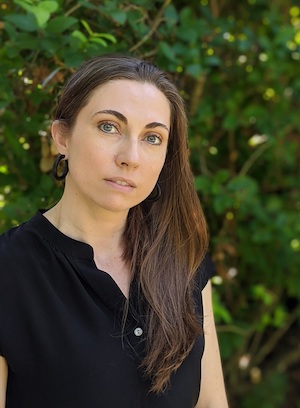Bilal Siddiq
Teresa K. Miller, born and raised in Seattle, Washington, is making a lasting mark in the world of poetry and literature. Selected as a winner of the 2020 National Poetry Series by former California Poet Laureate Carol Muske-Dukes for her book Borderline Fortune (Penguin, 2021), Miller now finds herself among the company of true giants of the field. Past winners include former U.S. Poet Laureate Billy Collins and fellow ΦBK member Joshua Bennett.
Writing has always been Miller’s career at heart. Recalling her youth, Miller remarked “I’ve wanted to write for as long as I could remember . . . . Saying I wanted to be a writer seemed as natural as a teacher or a firefighter.” Miller’s interest in writing evolved from a myriad of sources. Growing up, she was exposed to a cousin who had authored multiple novels with major publishers. Her research methods she credits to her late father, a genealogist with a keen eye for meticulous detail. While attending Centrum’s writing program for students, which she completed no less than seven times, Miller would also frequent Copper Canyon Press and was able to take week-long workshops taught by accomplished authors such as National Poetry Series winner David Romtvedt and Guggenheim Fellowship recipient Matthew Stadler. Even her elementary school, by focusing heavily on creative writing and having a half day dedicated to the task each week, played an important role in nurturing her fledgling interest in writing.
With such a strong foundation, her latest accolade as a winner of the 2020 National Poetry Series is, while astounding, not wholly unexpected. Before this selection, Miller’s work had already been garnering quite a bit of attention. Two of her previous submissions, sped (2013) and a collection titled California Building, had both made it to the finalist stage. Miller has also written for multiple journals and received the Mills Alumnae Scholarship toward her MFA.
At Barnard College, where she became a member of Phi Beta Kappa, Miller majored in history and minored in environmental science. She remarked that the decision not to major in English and even minor in the sciences has enabled her to “enjoy crossing between the worlds and, in particular, finding where they offer fruitful conversations.” Her background gives her work a unique flavor as she writes not only poetry, but also analyzes current issues through the eyes of a historian and the words of a poet. A recent example of this delicate and elegant interplay includes her piece “laid bare,” which briefly covers her thoughts on the turmoil in America brought to a head by George Floyd’s death.
Delving into her literary journey, Miller commented that there is an “inherent tension in academia between scholarship and creative work,” but credited her liberal arts education with providing her the realization that this tension, while existent, need not be antagonistic. Miller believes that “the deepest understanding of our human experience comes through the intersections of seemingly disparate approaches.” The interdisciplinary nature of her studies has allowed Miller to collaborate on books covering a variety of topics because she is able to oscillate between macroscopic views of the issue at hand and the underlying evidence. Much of her work depends upon her data analysis skills, rooted in her science background, intermixing with her emotional connection to and love of nature and the earth.
Winning the National Poetry Series is a great accomplishment and one that Miller will surely take great pride in; however, it does not seem that she intends on slowing down any time soon. Her unique blend of literature with science and research with emotion provides a breath of fresh air in the world of poetry as prose steadily seeks to steal center stage in the literary world. An emerging star with a much-needed new take on poetry, Miller is breaking down barriers and bringing poetry to the foreground once more.
Bilal Siddiq earned his bachelor’s degree in neuroscience from Rhodes College in Memphis, Tennessee, where he was inducted to Phi Beta Kappa in April 2020. Rhodes College is home to the Gamma of Tennessee chapter of Phi Beta Kappa.




